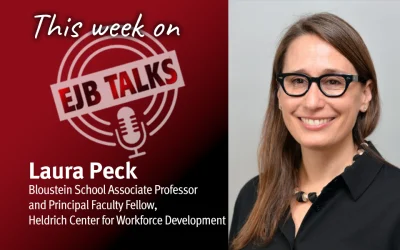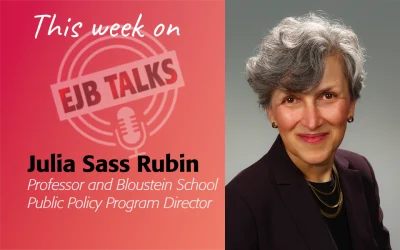In this season’s second episode of EJB Talks, Stuart Shapiro welcomes dual Bloustein School alumnus Jacob Persily ’16 (Health Administration), MHA ’19. Jacob works around the corner from the Bloustein School as an acute care administrator at Robert Wood Johnson University Hospital. He and Stuart discuss the potential and the challenges associated with the critical rollout of the Covid-19 vaccine. Jacob also highlights how the disparate healthcare system in the U.S. has compelled the hospital sector, typically resistant to change, to embrace adaptability to better serve the public.
Stuart Shapiro
Welcome to EJB Talks. I’m Stuart Shapiro, the Associate Dean of Faculty at the Bloustein School, and the purpose of this podcast is to talk with my colleagues and our alumni about policy, planning and health, the interaction between these issues and how they affect people in New Jersey, the United States and the world.
This season is all about looking forward. In this week and in that next week’s podcast, we’ll be looking at the health care sector, and the changes wrought by the COVID19 pandemic. Today, I’m very happy to be talking with one of our alumni from the Masters in Health Administration program. Jacob Persily. Welcome to the podcast, Jacob.
Jacob Persily
Good morning, Stu, thank you so much for having me.
Stuart Shapiro
Can you tell us a little bit about your current position?
Jacob Persily
I work at Robert Wood Johnson University Hospital right here in New Brunswick, just around the corner from Civic Square. I’ve held a number of project management type roles over the course of this pandemic, in staffing in spinning up our temperature screening process here at the hospital. And I took a new full-time role about a month ago doing operational analytics for our supply chain group. So people often ask me, What don’t I do here? A little bit of everything?
Stuart Shapiro
Well, I definitely want to get into that supply chain stuff. We’ve talked about that on the podcast before but not in the health environment. So let’s bookmark that. I do want to start though, with vaccines, because that’s on a lot of people’s minds these days. New announcements are coming out daily about who’s eligible. From your perch, how’s the vaccine rollout going?
Jacob Persily
I think the rollout is going as smoothly as it can go in the environment that is the healthcare system in this country where we run a very disparate healthcare system in my personal opinion. If we had a more nationalized approach to this, I think we’d be further along in the process than we are. But given the constraints and the fact that, as you said, the standards are changing every 12 hours, we’re doing about as well as we can.
Stuart Shapiro
Well, that’s good to hear. Now, the question, of course, on everyone’s mind is, is as well as we can well enough? I mean, we’re gonna need to get a lot of people vaccinated relatively quickly if we want to return to close to normal in other spheres. What, in your view, are the barriers…when you say “as well as you can,” what’s stopping it from being even better?
Jacob Persily
Healthcare is an industry that traditionally has been slow adopters of a lot of things. And with everything with this pandemic, we’ve had to very quickly shift just about everything we do. Several of the hospitals in New Jersey, had vaccine come in, in the morning, and we’re giving vaccine by the afternoon. And that’s how fast we’re doing things now. So as we are able, as fast as we can to spin up these mega sites, and to engage the community healthcare organizations, and the private pharmacies to get the vaccine out into the world. It will speed the process and get more shots in arms, which is the ultimate goal.
Stuart Shapiro
You mentioned that you’ve been in supply chain for a month or so. So I’m going to consider you an expert at this point. So, how does that part go? I mean, to have a vaccine, you need the vaccine itself, you need the delivery mechanisms, you need stuff to keep it cold. There’s a lot of pieces to that. How is the hospital handling that and what are the challenges there?
Jacob Persily
Without going into too many specifics, because I’m not permitted to really speak on this; we have been preparing for this vaccine from months before any of the emergency use authorizations came out from the CDC in terms of the cold supply chain piece of this, and ensuring we have enough supplies, ensuring we have the IT infrastructure to follow all of the government guidelines and documentation of who gets the vaccine and any potential issues involved. So we’ve been preparing for this in consultation with the State Department of Health for months. So we’ve actually been fairly good with the supply chain piece of this.
Stuart Shapiro
Great. I hadn’t even thought about the IT. I mean, if you’re going to give two doses to everyone, you need a pretty sophisticated record-keeping system to figure out who’s got what and who needs to get what when.
Jacob Persily
Not only record-keeping, but also as we’ve seen from the State Department of Health website that hasn’t quite handled the volume of folks trying to schedule these appointments. You need a very robust virtual scheduling platform to get folks into the system and then to know whether they need three or four weeks later that second dose scheduled.
Stuart Shapiro
Right. Now that makes a lot of sense. Have you… you know, we see on social media and in the popular press have you guys encountered vaccine resistance or just people really want to get this and understand the need to get it?
Jacob Persily
I’ll say from personal experience having volunteered several shifts in our vaccine clinic here… For many of our employees, this is the first time I’ve seen the true look of hope on their faces with this whole thing. Because it really is, many of our front liners have been with COVID patients straight through since this started. And really having this first true weapon to fight this is making people happy. And that really is great to see that.
Stuart Shapiro
Yeah, I can’t imagine the fact that, essentially every day, and there are other jobs where this is the case, but every day you’re risking your life by going to work. To all of a sudden have something that protects you, as you go into that has got to be a game-changer.
Jacob Persily
Several of us, myself included, spent the first few months in the spring, effectively isolating ourselves away from anyone who didn’t work here. From our families, from our loved ones from our friends, because we didn’t know what the next day was going to bring if it would possibly be harboring something. And it’s really nice to start to be able to think we might be getting back toward a new normal.
Stuart Shapiro
Yeah, that’s very refreshing. We have a lot of downers on this podcast. So I’m glad to hear that.
We keep talking as we talk with various guests about the future, about a post-pandemic world. In your eyes, do we see that world this year? Is it next year? What do the prospects look like?
Jacob Persily
I’m hopeful that we could start seeing by the end of this year, realistically, I’m thinking the beginning of next year. It really does depend on the country that you’re listening in. There are some small countries, I don’t want to get into politics, but everyone in the media is using Israel, as an example, has already vaccinated almost 25% of its population. And they’re expecting by April to have 100% of their adult population vaccinated. And they might get back to a more normal faster than a country like the US that’s doesn’t have that nationalized system to do this. You have a country like New Zealand, where they’ve effectively eradicated the virus by locking down the country for the last nine months. They’re essentially back to normal now, but in the States, we’re making progress.
Stuart Shapiro
Right. You know, it’s interesting, though, to get even in New Zealand or in Israel, once they’re at that point, they’re still not going to want to let other people in. So when we talk about getting back to normal, people being able to move around the world would be nice to return to, that’s probably further off.
Now let’s talk about, without going into specifics, your workplace. How is the pandemic and then the vaccine rollout, changed the way you do your job and the way a hospital doesn’t have to be your hospital, but any hospital operates?
Jacob Persily
Hospitals, along with most other industries have had to fundamentally look at how we are doing just about everything to ensure that we’re doing it safely and effectively. So in our hospital, we focus on space, staff, and supplies. All things that we’ve done very well with throughout the pandemic. And many of the changes we put into place, like how we are now more conservatively managing PPE to ensure a constant supply, are changes that are going to stay because they’re good processes that will help us move forward.
Stuart Shapiro
So let me ask a follow-up. I mean, for most of us, the changes wrought by the pandemic means more remote working and things like that. But that’s obviously not the kinds of changes we’re talking about in hospitals and in health administration. Do you see, and I asked this as someone who has responsibility for a program and Health Administration in our school, do you see us needing to teach Health Administration differently in the wake of the pandemic?
Jacob Persily
There are definitely changes in the industry. I’ll add, I don’t know if you know this, that I actually started as a part-time lecturer in the undergraduate program next week.
Stuart Shapiro
Oh great!
Jacob Persily
So I’m going to bring a lot of this to this new data management and healthcare course that two of us who are MHA Alum are co-developing this semester. It’s going to be a lot again, just looking at numbers. Because data is key, not only in healthcare, but in all the fields that Bloustein covers.
And being able to effectively work with large quantities of data and large quantities of data that are coming in at breakneck pace with everything with this… I mean, looking at the calendar, the first confirmed case of Coronavirus in this country was one year ago. Just think about that. That we’ve come this far with this in a year. Which is faster than we’ve fought anything like this in the past in the modern history of the world. So we really are doing incredible things.
Stuart Shapiro
It’s going to be certainly a new day. We’re not going back to the way things were before pre-pandemic. Anything else any other changes that you’d like to highlight for our listeners about hospital management that you’ve learned in the past year?
Jacob Persily
I’ll say that many of our leaders have grown as leaders. Our frontline teams have grown as teams. When I’ve spent time on the COVID units for various projects, the teamwork you see among the staff in caring for these patients and their time of need is unlike anything I’ve ever seen. So it’s really enlightening to see folks coming together to do the best care we can for our patients to serve the community here in Central New Jersey.
Stuart Shapiro
Yeah, the stories we hear of frontline workers are just sometimes excruciating, and sometimes inspiring in terms of what they’ve had to go through. Let me let you end with a final pitch on how important it is for everyone to get vaccinated.
Jacob Persily
This vaccine is our first light at the end of the tunnel for this. I know folks are hitting pandemic fatigue point you’re tired of staying home, you’re tired of not being able to get Lysol or toilet paper or you’re tired of wearing a mask. If everyone gets the vaccine, we might start moving to a point where we can get past this. And I speak from a point of personal contention. Most of my personal life revolves around the Theater in New York and I have hundreds of friends who will make a living in the performing arts that have been effectively unemployed for the last year. So to try and get everything in that sector of the world back moving, please get the COVID vaccine when you’re eligible.
Stuart Shapiro
Yeah, I’d like to be back in front of a classroom and so I have to echo everything you said there. I want to be teaching in Fall 2021 in person, not staring at the screen like I’m doing right now. So the way we get there is by getting people vaccinated. Jacob, thanks for coming on.
Jacob Persily
Thank you for having me and have a wonderful spring semester. I think we’re releasing this the first day of the term, right?
Stuart Shapiro
That’s right. It’ll be our first day of the semester and so people don’t listen to this in class but listen to it afterward.
Also a big thank you to our production team, Amy Cobb and Karyn Olsen. We’ll be back next week with another talk from another expert at the Bloustein School. Until then, stay safe.




